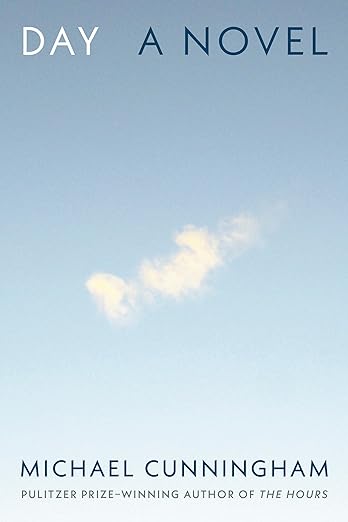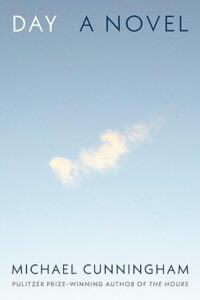Book Review: Day by Michael Cunningham
London: 4th Estate, 2024
Michael Cunningham’s new novel, Day, is an intricate, in-depth study of the emotions of the members of a family as they each make their way through three consecutive April 5ths. In the background is the COVID pandemic, as it runs its most virulent course between 2019 and 2021.
Day is a novel of subtleties, one that immerses you in its subject matter slowly, as if, as often happens in real life, you’re getting to know the characters bit by bit until you are completely absorbed by their worlds. It’s plot, if it can be said to have one, is the plot of the slow, ins and outs of each character’s self-examination as we glimpse them perhaps moving forward, perhaps swirling pointlessly in painful, eddies. The characters are smart, but not brilliantly clever, well-meaning, but often unable to overcome their self-absorption enough to give completely to those they love. In a sense, they are ordinary but with a hint of the tragic.
Robbie, whose perceptions are at the center of the first two years of the novel, is a gay mid-thirties 6th grade schoolteacher, whose choice of profession represents mostly a rebellion against his father’s attempt to direct him and resulted in him refusing acceptance to medical school and, instead, going into teaching. He is single, post-breakup with his most recent lover, and lives with his sister and her husband and two children, with all of whom he is extremely close. All of the relationships within this family are filled, to the extent of consuming preoccupation, with unacknowledged, but always appreciated, love. All the adults, Isabel, Robbie’s sister, Dan, Isabel’s retired, once nearly famous rocker husband, and Garth, Dan’s younger artist brother, are at a point in their lives where their dreams and their hopes for a fairytail-style life are slipping away, and all of them are obsessed with self-examination of the person they have become. Yet, central for all of them, is their love for one another, most easily expressed by their focus on their children. For Dan and Isabel, it is pre-adolescent Nathan and 5-year old Violet, the former surly and wary of any sign of his dependence upon adults and the latter immersed in make-believe princess dreams while developing a variety of phobias, which she tries to impose on her family’s household. For Garth, Dan’s brother, it is his infant son, Odin, whose mother, Chess, despises him, but relies upon him as a baby-sitter, and with whom he is in love.
We become most acquainted with Robbie and Isabel, who are closer to each other than to anyone else, and who share the creation of Wolfe, a fantasy-blog character, who is their enviable, charismatic alter-ego that has thousands of online followers. Both of them are faced with a sense of emptiness in their lives. Robbie has not given up looking for an antidote and realizes it will not come from teaching, while suspecting it may come from finding the right love-partner, although so far it has not. Isabel, whose ability to express her emotions is blunted, the aftermath of a childhood of maternal rejection, blames herself for her remoteness and lives on the edge of suicide, saved mostly by her love for her children and her brother and the generous benignancy of her husband. They struggle this way through Robbie’s impending move to another residence where he can break his dependence upon his sister’s family, although no one, especially the children, wants to see him go.
When Robbie finally leaves, he moves to Iceland and a life of solitude. Dan and Isabel struggle on as the pandemic hits and everyone is confined to home. Violet’s phobia-proneness is exacerbated by COVID, and Nathan, being taught through Zoom, becomes more withdrawn and surlier. Garth, Dan’s brother tries to build a relationship with his infant child’s mother, who sees him only as a sperm-donor, although they once had a relationship, and Dan settles into writing sad ballads that attract an online following. Isabel intensifies her disappointment in herself, as her magazine-editor career is ending because of online competition, and she feels helpless watching her children become less and less able to cope with their lives, while she is unable to reach out to them, emotionally.
By the end of the pandemic’s most deadly phase, Robbie has died of COVID, and the family, Dan and Isabel, Nathan and Violet, Garth, his son and Chess, his son’s mother, gather to dispose of Robbie’s ashes at a secluded lakeside retreat, which is where Isabel now lives after leaving Dan, and where the kids visit. They all try, with varying success, to reach out to each other and maintain the deep, but flawed relationships that are for all of them the most important things in their lives.
When I began reading Day, I had the feeling that I was reading a plot-less examination of the interior of fairly ordinary characters whose inner experiences were described in a poetic, semi-philosophical way that characterized a literary mind, but not real people. A demonstration of the author’s prowess, but not a story. After all, the author is a professor of creative writing at Yale, the author of several novels, the most well-known of which is the Pulitzer Prize winning, The Hours, which was made into an award-winning film. Day even reverts to the focus on a single-day used successfully in The Hours. By the end of the novel, though, I cared about each character enough that when one of the children was in danger, I was unable to resist skipping ahead to make sure that he survived. I had gotten to know the family well enough to understand that their various adjustments to life were too fragile to be able to stand another loss. The literary nuances and deep musings of the characters had become the hallmarks of their personalities, ones I could relate to, and I was attached to each of them. I had been drawn into the dynamics of. the people and the family enough to care. They seemed less literary caricatures and more real people. It was a story that could happen, and probably did happen, to many, and I felt fortunate to, for the length of the novel, feel part of it. In other words, Day is a wonderful book, exquisitely written, and one that will draw you completely into the lives of its characters.
Interested in scif-fi about AIs solving moral dilemmas in a future that has them exploring our galaxy? Read Casey Dorman’s Voyages of the Delphi novels: Ezekiel’s Brain and Prime Directive. Available on Amazon. Click Here!

Subscribe to Casey Dorman’s Newsletter. Click HERE






